英语四级考前复习资料
大学英语四级复习资料·整理版
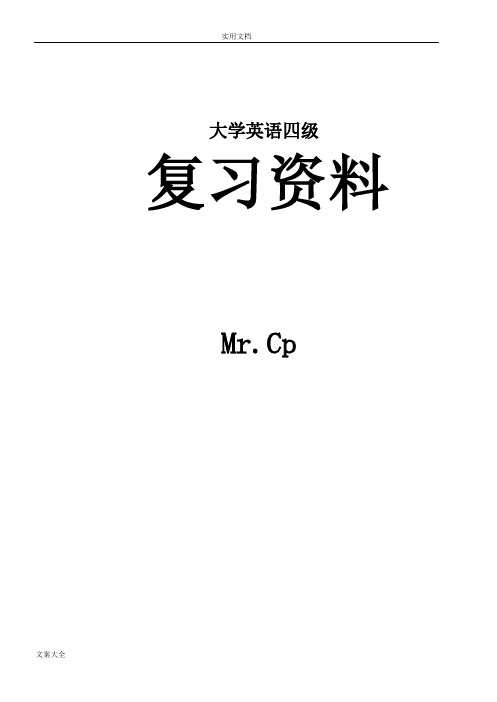
实用文档文案大全大学英语四级复习资料 Mr.Cp滴水渐累成沧海,拳石频移成泰山祝大家顺利过级目录第一部分.听力部分 (2)第二部分.最新英语四级高频词汇 (23)第三部分.四级阅读笔记 (31)第四部分.完形填空做题技巧 (36)第五部分.翻译经典练习 (38).第六部分.写作七类精彩句型 (40)第七部分.写作必备模板和句型 (42)第八部分.综合技能训练 (45)第九部分.作文训练 (73)第十部分.英语谚语警句 (85)资料说明:本复习资料非教材用书。
复习资料主要收集了四级听力、阅读、词汇、作文等一些英语四级相关的技巧、方法和内容,主要提供给有需要考四级的同学自己复习所用。
1滴水渐累成沧海,拳石频移成泰山祝大家顺利过级第一部分.听力部分一、听力内容1.Section A 对话短对话 (5分02秒) 8个对话: 4分12秒长对话 (5分58秒)Conversation 1 (4 questions):对话内容(1分45秒)+问题(1分25秒)Conversation 2 (3 questions):对话内容(1分45秒)+问题(1分02秒)2.Section B 短文(10分05秒)Directions: 35秒Passage 1 (3 questions):文章内容(1分25秒)+问题(1分10秒)Passage 2 (3 questions):文章内容(2分25秒)+问题(1分10秒)Passage 3 (4 questions):文章内容(1分45秒)+问题(1分55秒)3.Section C 复合式听写 (11分20秒)Directions: 45秒第一遍: 2分10秒第二遍:第一句停顿:1分05秒第二句停顿:1分35秒第三句停顿:1分15秒第三遍:2分10秒(以上时间根据文章内容会有所变化)二、听力技巧四级听力一直困扰着我们每一位考生,听不懂磁带中的内容是什么,不知道该如何选择,而听力在英语四级考试中又占很大一部分比重,掌握好英语四级听力技巧才能快速提高英语成绩,以下总结出几点有关英语四级听力技巧。
最新大学英语四级考试复习资料(打印版)
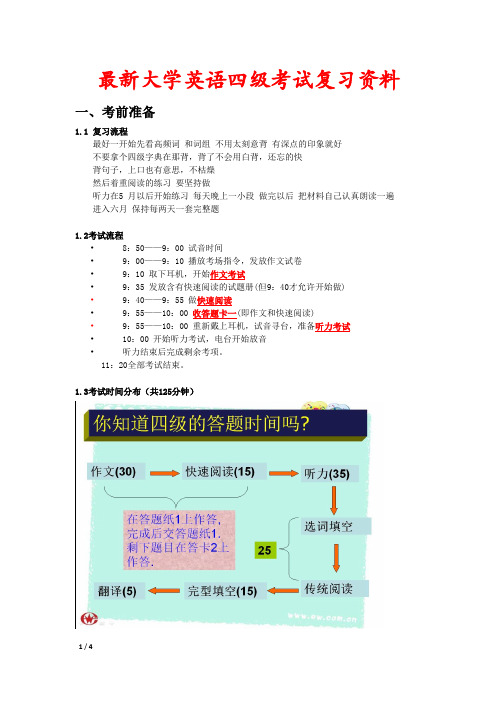
最新大学英语四级考试复习资料一、考前准备1.1 复习流程最好一开始先看高频词和词组不用太刻意背有深点的印象就好不要拿个四级字典在那背,背了不会用白背,还忘的快背句子,上口也有意思,不枯燥然后着重阅读的练习要坚持做听力在5 月以后开始练习每天晚上一小段做完以后把材料自己认真朗读一遍进入六月保持每两天一套完整题1.2考试流程• 8:50——9:00 试音时间•9:00——9:10 播放考场指令,发放作文试卷•9:10 取下耳机,开始作文考试•9:35 发放含有快速阅读的试题册(但9:40才允许开始做)•9:40——9:55 做快速阅读•9:55——10:00 收答题卡一(即作文和快速阅读)•9:55——10:00 重新戴上耳机,试音寻台,准备听力考试•10:00 开始听力考试,电台开始放音•听力结束后完成剩余考项。
11:20全部考试结束。
1.3考试时间分布(共125分钟)1.4 答题顺序推荐二.答题技巧 (仅供参考)2.1 写作偶认为这是最容易应对而且也是最容得分的题!只需考前花9 秒种,即有可能取得9 分(满分100 分制)以上的好成绩。
偶当时只是在开考前熟记了两个比较有难度的经典句型,考试时想办法在在首句和结尾处各用了一个,然后剩余部分,或者自由发挥,或者写几段偶喜欢的英文歌词(注意不是汉语拼音的),或者写一下李阳疯狂英语里的搞笑句子。
你不要怀疑偶的做法,现在偶给大家分析一下此法可行的原因:判卷时,每个老师桌子上都会有一大叠卷子,远远超过你高考时的复习资料,你想,只要是个人,谁会有耐心仔细看那么多的英语文章,再加上一般判卷发生在大夏天,天气闷热,心情烦躁,每天关在小屋里看偶们这些无聊低级的文章,不许上网,不许QQ,不让开MSN,更不可能写博客,好人也会被折磨疯的。
所以他们判卷时,一般只看开头和收尾句,再大体看一下字数够不够,有的正在谈恋爱的老师,心情比较好,还会看有没有错误的单词,为了防止这种情况,我提醒大家,我们的目标不是写一篇惊世骇俗的文章,而是尽量在三十分种内不说一句错话,不写一个错单词。
英语四六级复习资料重点推荐
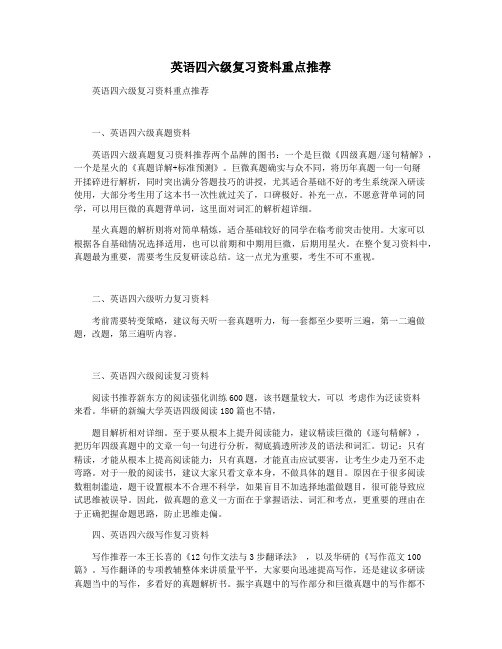
英语四六级复习资料重点推荐英语四六级复习资料重点推荐一、英语四六级真题资料英语四六级真题复习资料推荐两个品牌的图书:一个是巨微《四级真题/逐句精解》,一个是星火的《真题详解+标准预测》。
巨微真题确实与众不同,将历年真题一句一句掰开揉碎进行解析,同时突出满分答题技巧的讲授,尤其适合基础不好的考生系统深入研读使用,大部分考生用了这本书一次性就过关了,口碑极好。
补充一点,不愿意背单词的同学,可以用巨微的真题背单词,这里面对词汇的解析超详细。
星火真题的解析则将对简单精炼,适合基础较好的同学在临考前突击使用。
大家可以根据各自基础情况选择适用,也可以前期和中期用巨微,后期用星火。
在整个复习资料中,真题最为重要,需要考生反复研读总结。
这一点尤为重要,考生不可不重视。
二、英语四六级听力复习资料考前需要转变策略,建议每天听一套真题听力,每一套都至少要听三遍,第一二遍做题,改题,第三遍听内容。
三、英语四六级阅读复习资料阅读书推荐新东方的阅读强化训练600题,该书题量较大,可以考虑作为泛读资料来看。
华研的新编大学英语四级阅读180篇也不错,题目解析相对详细。
至于要从根本上提升阅读能力,建议精读巨微的《逐句精解》,把历年四级真题中的文章一句一句进行分析,彻底搞透所涉及的语法和词汇。
切记:只有精读,才能从根本上提高阅读能力;只有真题,才能直击应试要害,让考生少走乃至不走弯路。
对于一般的阅读书,建议大家只看文章本身,不做具体的题目。
原因在于很多阅读数粗制滥造,题干设置根本不合理不科学,如果盲目不加选择地滥做题目,很可能导致应试思维被误导。
因此,做真题的意义一方面在于掌握语法、词汇和考点,更重要的理由在于正确把握命题思路,防止思维走偏。
四、英语四六级写作复习资料写作推荐一本王长喜的《12句作文法与3步翻译法》,以及华研的《写作范文100篇》。
写作翻译的专项教辅整体来讲质量平平,大家要向迅速提高写作,还是建议多研读真题当中的写作,多看好的真题解析书。
全国英语四级考试复习资料

英语四级资料首先,我们首先定第一个目标。
既不是突击单词,也不是突击阅读,而是尽量在规定的2小时20分钟内完成。
怎么完成?那就是研究题型。
市面上有很多四级真题和预测题,大家可以买一套来做做。
研究题型非常重要,因为知己知彼,百战不殆,你如果连对方都不了解,怎么去战胜他?买回试题后,争取每天做一套完整的,包括听力(作文除外),给自己规定时间,作文三十分钟除外,拿个秒表开始做题,中途碰到不认识的单词,不要中断,不要对答案,继续往下做,直至做完。
然后再去对答案,根据自己的习惯,把自己做错的标记一下,平时有时间就把做过的卷子拿出来温习。
第二,单词和写作。
其实我说单词并不是要大家去拿本四级的单词书正天背来背去,背到天昏地暗,这如,14幅大,作文30分钟,写作卷子收上去后,发下来的卷子马上做精读,按照刚刚我的介绍,把精读做完后,还剩一些时间,争分夺秒,马上看听力的题目,因为精读一结束是不会给你时间看题目的,所以你要靠这挤出来的几分钟迅速地把听力题目浏览一遍,因为时间太紧了;接着听力结束后马上翻到最后一页,把翻译题目做完,题目不多,只有5个,很容易在5分钟内解决。
然后把做好的听力和快速阅读的答案写在答案纸上,写完后再安新做精读,然后大家按照自己平时的积累,一步一步地做,因为我英语基础并不是很好,所以我做到离结束前10分钟的时候还差最后一个大题——完型填空没做,匆匆忙忙做完,然后冷静点,把答案填好,再次快速检查一遍考号和姓名以及答案,考试刚好结束。
我们在这里依次来看各部分的解题技巧:PartIWriting(30minutes)一、篇章连贯:可以通过文章内容的内在联系来表现篇章的连贯性。
1、具体到一般:表现形式为先举例具体的事例进行分析、说明,进而得出论证或结论,在段末往往以主题句的形式表现出来。
2、一般到具体:表现为在文章段首以主题句的形式出现,然后通过具体的叙述、说明、举例使主题句变得具体、明白、易懂。
二、常用句型1、开头It'swellknowntousthat...Recently,...hasbeenbroughttopopularattention/hasbecomethefocusofpublicconcern. Oneoftheuniversalissueswearefacedwith/thatcauseincreasingconcernisthat...People'sview/opinions/ideason...varyfrompersontoperson.Somepeoplethinkthat...theyholdthisopinionbecause...写作用得最广的句式以下是短文写作中使用率最高、覆盖面最广的基本句式,每组句式的功能相同或相似,可根据自己的情况选择其中的1-2个,做到能够熟练正确地仿写或套用。
全国英语四级考试复习资料
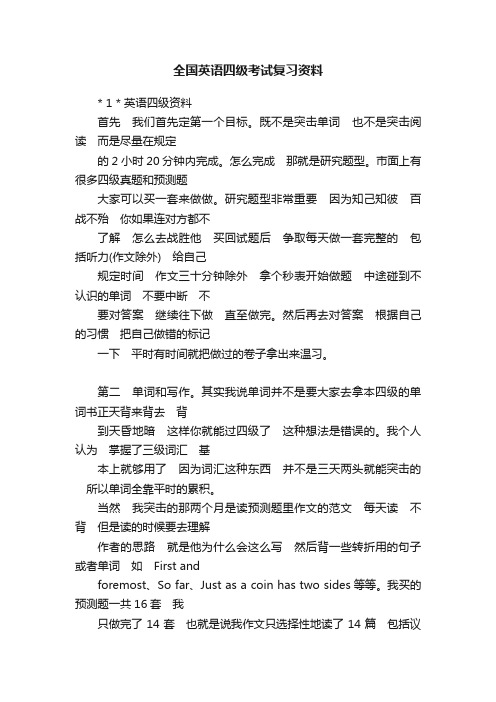
全国英语四级考试复习资料* 1 * 英语四级资料首先我们首先定第一个目标。
既不是突击单词也不是突击阅读而是尽量在规定的2小时20分钟内完成。
怎么完成那就是研究题型。
市面上有很多四级真题和预测题大家可以买一套来做做。
研究题型非常重要因为知己知彼百战不殆你如果连对方都不了解怎么去战胜他买回试题后争取每天做一套完整的包括听力(作文除外)给自己规定时间作文三十分钟除外拿个秒表开始做题中途碰到不认识的单词不要中断不要对答案继续往下做直至做完。
然后再去对答案根据自己的习惯把自己做错的标记一下平时有时间就把做过的卷子拿出来温习。
第二单词和写作。
其实我说单词并不是要大家去拿本四级的单词书正天背来背去背到天昏地暗这样你就能过四级了这种想法是错误的。
我个人认为掌握了三级词汇基本上就够用了因为词汇这种东西并不是三天两头就能突击的所以单词全靠平时的累积。
当然我突击的那两个月是读预测题里作文的范文每天读不背但是读的时候要去理解作者的思路就是他为什么会这么写然后背一些转折用的句子或者单词如First andforemost、So far、Just as a coin has two sides等等。
我买的预测题一共16套我只做完了14套也就是说我作文只选择性地读了14篇包括议论文记叙文说明文信这四种文体。
而且我的大部分四级的词汇都是靠了这十几篇作文累积的。
第三听力。
因为四级听力实际上是不难的无非就是语速快让人反映不过来而且最要命的是还加了填空不但有单词填空还有句子填空分数比例是比较大的。
其实听力我没什么说的除了每天听一套预测听力题目外我没别的技巧完全是靠多做题多练习。
第四阅读。
最关键的题型新四级阅读题型分两类第一类是快速阅读第二类是精读。
快速阅读篇幅大字数大约在1000字左右但句子不难理解词汇也不是很难如果两月内基本上能两天做一套题目的话拿下快速阅读是很容易的。
这里我向大家透露个技巧快速阅读头七个题目是对错题后三个是根据内容填空。
英语四级学习复习资料梳理
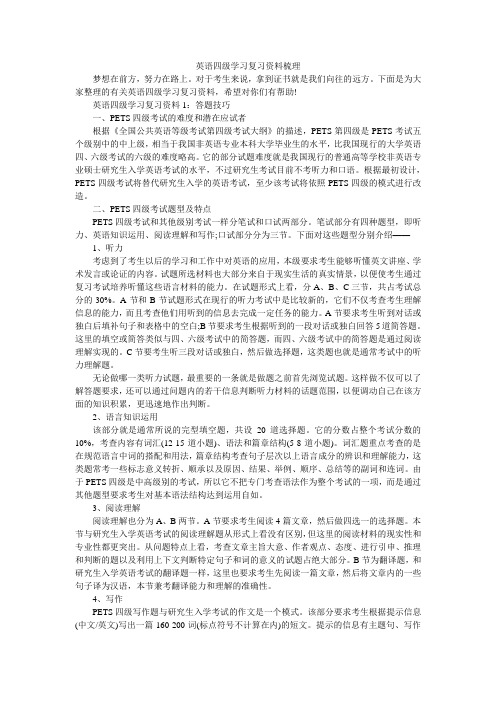
英语四级学习复习资料梳理梦想在前方,努力在路上。
对于考生来说,拿到证书就是我们向往的远方。
下面是为大家整理的有关英语四级学习复习资料,希望对你们有帮助!英语四级学习复习资料1:答题技巧一、PETS四级考试的难度和潜在应试者根据《全国公共英语等级考试第四级考试大纲》的描述,PETS第四级是PETS考试五个级别中的中上级,相当于我国非英语专业本科大学毕业生的水平,比我国现行的大学英语四、六级考试的六级的难度略高。
它的部分试题难度就是我国现行的普通高等学校非英语专业硕士研究生入学英语考试的水平,不过研究生考试目前不考听力和口语。
根据最初设计,PETS四级考试将替代研究生入学的英语考试,至少该考试将依照PETS四级的模式进行改造。
二、PETS四级考试题型及特点PETS四级考试和其他级别考试一样分笔试和口试两部分。
笔试部分有四种题型,即听力、英语知识运用、阅读理解和写作;口试部分分为三节。
下面对这些题型分别介绍——1、听力考虑到了考生以后的学习和工作中对英语的应用,本级要求考生能够听懂英文讲座、学术发言或论证的内容。
试题所选材料也大部分来自于现实生活的真实情景,以便使考生通过复习考试培养听懂这些语言材料的能力。
在试题形式上看,分A、B、C三节,共占考试总分的30%。
A节和B节试题形式在现行的听力考试中是比较新的,它们不仅考查考生理解信息的能力,而且考查他们用听到的信息去完成一定任务的能力。
A节要求考生听到对话或独白后填补句子和表格中的空白;B节要求考生根据听到的一段对话或独白回答5道简答题。
这里的填空或简答类似与四、六级考试中的简答题,而四、六级考试中的简答题是通过阅读理解实现的。
C节要考生听三段对话或独白,然后做选择题,这类题也就是通常考试中的听力理解题。
无论做哪一类听力试题,最重要的一条就是做题之前首先浏览试题。
这样做不仅可以了解答题要求,还可以通过问题内的若干信息判断听力材料的话题范围,以便调动自己在该方面的知识积累,更迅速地作出判断。
大学英语四级考试复习材料
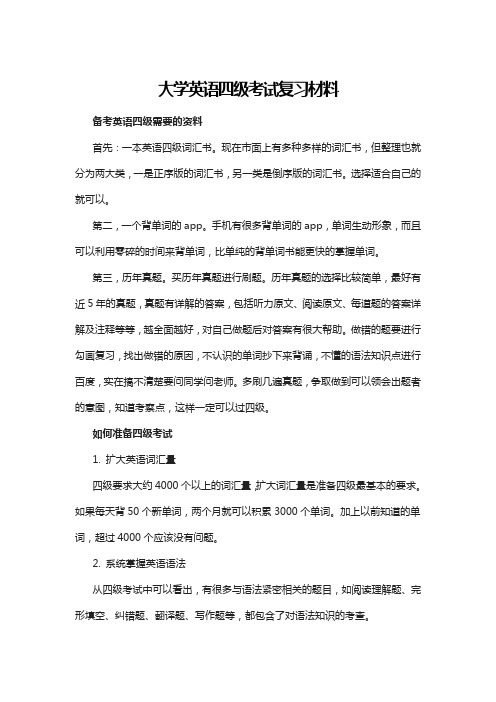
大学英语四级考试复习材料备考英语四级需要的资料首先:一本英语四级词汇书。
现在市面上有多种多样的词汇书,但整理也就分为两大类,一是正序版的词汇书,另一类是倒序版的词汇书。
选择适合自己的就可以。
第二,一个背单词的app。
手机有很多背单词的app,单词生动形象,而且可以利用零碎的时间来背单词,比单纯的背单词书能更快的掌握单词。
第三,历年真题。
买历年真题进行刷题。
历年真题的选择比较简单,最好有近5年的真题,真题有详解的答案,包括听力原文、阅读原文、每道题的答案详解及注释等等,越全面越好,对自己做题后对答案有很大帮助。
做错的题要进行勾画复习,找出做错的原因,不认识的单词抄下来背诵,不懂的语法知识点进行百度,实在搞不清楚要问同学问老师。
多刷几遍真题,争取做到可以领会出题者的意图,知道考察点,这样一定可以过四级。
如何准备四级考试1. 扩大英语词汇量四级要求大约4000个以上的词汇量,扩大词汇量是准备四级最基本的要求。
如果每天背50个新单词,两个月就可以积累3000个单词。
加上以前知道的单词,超过4000个应该没有问题。
2. 系统掌握英语语法从四级考试中可以看出,有很多与语法紧密相关的题目,如阅读理解题、完形填空、纠错题、翻译题、写作题等,都包含了对语法知识的考查。
考生在复习语法知识时,要重点掌握10大类单词的用法,16大时态和语态的用法,各种句子的用法等。
因此学好了语法,才能提高答题正确率。
3. 练习不同类型问题的听力理解特别是复合式听写部分,要求考生不仅要理解它是什么,还要写出正确的答案,尤其是比较难的单词拼写。
因此大多数考生在练习听力的过程中特别要加强书写能力,平时可以练习比较复杂的单词拼写,在考试的听写部分会比较有用。
4. 集中精力做阅读理解练习阅读理解题在整个考试中占有很高的分数,同时阅读理解题中的后两篇文章难度较大,所以做题的时间比较长。
因此,考生在备考时需要大量练习这类题型,在做题型的过程中要积累经验和掌握做题型的技巧,在判断句子的正误和填空时要重视细节点。
四级英语用什么复习资料
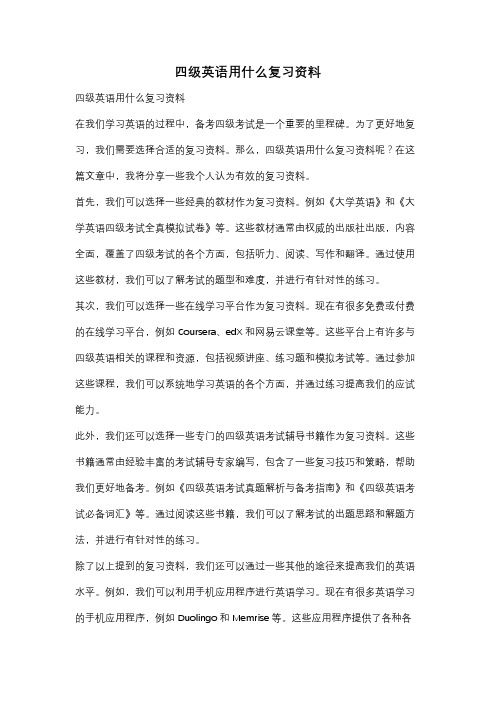
四级英语用什么复习资料四级英语用什么复习资料在我们学习英语的过程中,备考四级考试是一个重要的里程碑。
为了更好地复习,我们需要选择合适的复习资料。
那么,四级英语用什么复习资料呢?在这篇文章中,我将分享一些我个人认为有效的复习资料。
首先,我们可以选择一些经典的教材作为复习资料。
例如《大学英语》和《大学英语四级考试全真模拟试卷》等。
这些教材通常由权威的出版社出版,内容全面,覆盖了四级考试的各个方面,包括听力、阅读、写作和翻译。
通过使用这些教材,我们可以了解考试的题型和难度,并进行有针对性的练习。
其次,我们可以选择一些在线学习平台作为复习资料。
现在有很多免费或付费的在线学习平台,例如Coursera、edX和网易云课堂等。
这些平台上有许多与四级英语相关的课程和资源,包括视频讲座、练习题和模拟考试等。
通过参加这些课程,我们可以系统地学习英语的各个方面,并通过练习提高我们的应试能力。
此外,我们还可以选择一些专门的四级英语考试辅导书籍作为复习资料。
这些书籍通常由经验丰富的考试辅导专家编写,包含了一些复习技巧和策略,帮助我们更好地备考。
例如《四级英语考试真题解析与备考指南》和《四级英语考试必备词汇》等。
通过阅读这些书籍,我们可以了解考试的出题思路和解题方法,并进行有针对性的练习。
除了以上提到的复习资料,我们还可以通过一些其他的途径来提高我们的英语水平。
例如,我们可以利用手机应用程序进行英语学习。
现在有很多英语学习的手机应用程序,例如Duolingo和Memrise等。
这些应用程序提供了各种各样的学习内容和练习题,帮助我们在任何时间、任何地点都能够进行英语学习。
此外,我们还可以通过参加英语角和英语培训班来提高我们的英语口语和听力能力。
英语角是一个可以和其他学习英语的人交流的场所,通过和他人的交流,我们可以提高我们的口语表达能力。
而英语培训班则提供了专业的英语培训课程,帮助我们系统地学习英语的各个方面。
综上所述,四级英语的复习资料有很多选择。
大学英语四级复习资料完整版.docx
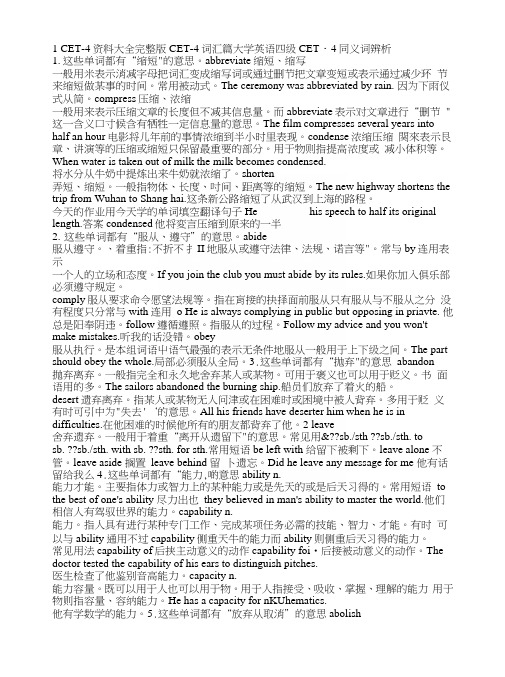
1 CET-4资料大全完整版CET-4词汇篇大学英语四级CET・4同义词辨析1.这些单词都有“缩短"的意思。
abbreviate缩短、缩写一般用米表示消减字母把词汇变成缩写词或通过删节把文章变短或表示通过减少环节来缩短做某事的时间。
常用被动式。
The ceremony was abbreviated by rain. 因为下雨仪式从简。
compress压缩、浓缩一般用来表示压缩文章的长度但不减其信息量。
而abbreviate表示对文章进行“删节 "这一含义口寸候含有牺牲一定信息量的意思。
The film compresses several years into half an hour电影将儿年前的事情浓缩到半小时里表现。
condense浓缩压缩関來表示艮章、讲演等的压缩或缩短只保留最重要的部分。
用于物则指提高浓度或减小体积等。
When water is taken out of milk the milk becomes condensed.将水分从牛奶中提炼出来牛奶就浓缩了。
shorten弄短、缩短。
一般指物体、长度、吋间、距离等的缩短。
The new highway shortens the trip from Wuhan to Shang hai.这条新公路缩短了从武汉到上海的路程。
今天的作业用今天学的单词填空翻译句子He _________ his speech to half its original length.答案condensed他将変言压缩到原来的一半2.这些单词都有“服从、遵守”的意思。
abide服从遵守。
、着重指:不折不扌II地服从或遵守法律、法规、诺言等"。
常与by连用表示一个人的立场和态度。
If you join the club you must abide by its rules.如果你加入俱乐部必须遵守规定。
comply服从要求命令愿望法规等。
大学英语四级复习资料(全)
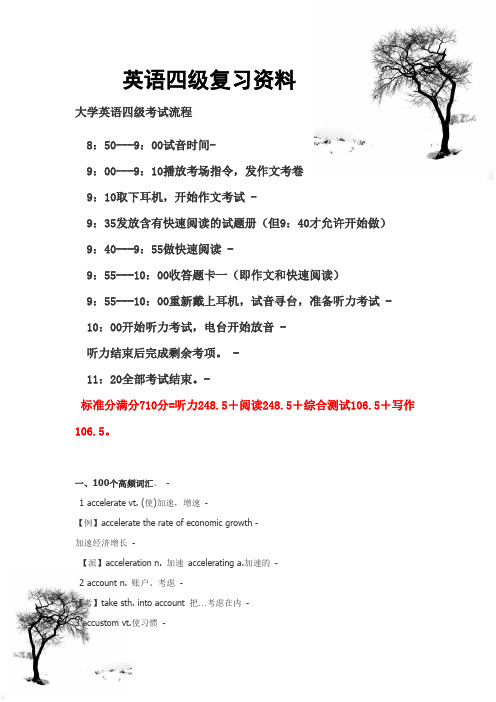
英语四级复习资料大学英语四级考试流程8:50---9:00试音时间-9:00---9:10播放考场指令,发作文考卷9:10取下耳机,开始作文考试 -9:35发放含有快速阅读的试题册(但9:40才允许开始做)9:40---9:55做快速阅读 -9:55---10:00收答题卡一(即作文和快速阅读)9:55---10:00重新戴上耳机,试音寻台,准备听力考试 -10:00开始听力考试,电台开始放音 -听力结束后完成剩余考项。
-11:20全部考试结束。
-标准分满分710分=听力248.5+阅读248.5+综合测试106.5+写作106.5。
一、100个高频词汇。
-1 accelerate vt. (使)加速,增速-【例】accelerate the rate of economic growth -加速经济增长-【派】acceleration n. 加速accelerating a.加速的-2 account n. 账户、考虑-【考】take sth. into account 把…考虑在内-3 accustom vt.使习惯-【考】be accustomed to -4 adapt vi. 适应-【考】adapt to…适应-5 adjust vi.适应-【考】adjust to...适应… -6 advocate vt. 宣扬-7 affluent a.富裕的-【派】affluence n.富裕-8 annoy vt.使烦恼, 使恼怒-【派】annoying a. 令人恼人的; -annoyance n. 烦恼; -annoyed a.颇为生气的-9 ascribe vt.把…归咎于-【考】ascribe..to 归因于-10 assess vt.评估-【派】assessment n. 评估-11 assign vt.指派,选派;分配,布置(作业)- 【派】assignment 作业-12 assume vt.假象、假定-13 attain vt.获得-【考】attain one's ideal 达到理想-14 attribute vt. 把…归因于-【考】attribute sth.? to 把...归咎于-15 attribute vt.归咎于【考】be attributed to? attribute sth. to … -16 automatically ad. 自动地-17 boost vt.提高,推动,使增长n. 推动,增长- 【例】boost the economy 推动经济增长-【派】booster n.支持者,推动器-18 brilliant a.光辉的、辉煌的-【派】brilliance n. -19 collaborate vi.合作-【考】collaborate with. sb. -20 comprehensive a. 综合的-【考】综合性大学-21 conscious a. 有意识的-【考】be conscious of sth. 对…有意识-22 conserve vt.保存、节省-【考】conserve energy 保护能源-23 considerate a. 考虑周到的-24 contribute vt.贡献-【考】contribute to 导致、带来、为…贡献25 convenient a.方便的n.convenience 方便-26 convey vt.传达-27 cooperate vt.合作-【考】cooperative a.合作的-28 coordinate vt.合作-29 cultivate vt.培养-30 derive vt. 出自、源于-【考】derive from … -31 despair vi.绝望; n. 绝望-【考】despair of 绝望; sb. be in despair 某人处于绝望中- 32 disapprove vt. 不批准、不赞同-【派】disapproval n. 不赞同-【考】express strong disapproval -33 dismiss vt.撤销、免职-【考】be dismissed by one's company 被公司解雇-34 distinguish vt.辨别-【派】distinguished a.? 突出的-35 distribute vt.分配、分发-【考】distribution n.分配、分发-36 dominate vt. 支配、统治-【考】male-dominated society 男性主导社会-37 embarrass vt.使窘迫, 使尴尬; -【派】embarrassed a.(某人)尴尬的; - embarrassment n. 沮丧-embarrassing a. (某事)令人尴尬的-38 employ vt. 雇佣;使用-【考】in the employ of 受雇于-【派】employer n. 雇主;employee n.雇员- employment n. 雇佣, 工作unemployment n. 失业- 39 engage vt. 从事、订婚-【考】be engaged in sth. 从事… -40 enhance vt.加强-41 enroll vt.注册、使…入会-【派】enrollment -42 evacuate vt. 撤走、疏散-43 evaluate vt.评价、估计-【派】evaluation n. -44 evaluate vt.评价、估计-45 excessive a.过度的-46 frustrate vt.使沮丧, 使灰心-【派】frustration n. 挫折; frustrating a. 令人沮丧的-47 genetic a.遗传的-48 guarantee vt. 保证-49 identify vt.鉴别、验明-【考】idenfity theft 辨别偷窃-50 immigrate vt. 移民-【派】immigrant n.移民immigration -51 implement vt.实施-【派】implementation n. -52 incline vi.倾向-【考】be inclined to do sth. 倾向于做某事-53 inferior a.下级的、下等的-【考】be inferior to 比…低级-54 injure vt. 受伤-【派】injured a.受伤的; injury n. 受伤-55 inquire vi. 询问-56 instinct n.本能、直觉-【考】human instinct 人类本能-57 integrate vt. 使结合、使一体化-【派】integral a.一体的;integration n.一体-【考】as an integral whole 作为一个整体global economic integration 全球经济一体化-58 internship n.实习-59 inverse a.倒转的、反转的-60 justify vt.证明…是正当的-61 launch vt. 发射、开展-【考】launch the spacecraft 发射飞船launch a movement 发起一项运动-62 negative a.消极的-63 notify vt.通知、告诉-【派】notification n. -64 obligation n.? 责任、义务-【考】legal obligation? 法律责任-65 obstacle n.障碍-66 optimistic a. 乐观的-【考】be optimistic about sth.对…很乐观-67 originate vt.由…产生-【考】originate from 由…产生-68 overcome vt.战胜, 克服-【例】overcome difficulties 克服困难-69 phenomenon n.现象-70 positive a.积极的-71 potential a.潜在的-【考】potential customer 潜在客户-72 preferable a. 更好的-73 prevail vt.压倒、胜过-【派】prevailling a. 流行的-74 priority n. 优先-【考】sth. is the top priority 优先考虑… -75 proceed vi.进行、着手-76 prompt vt.刺激、推动-【考】prompt sb. to do sth. -77 proportion n.比例-【派】proportional a.相应的、成比例的-78 pursue vt. 追求-【派】pursuit n. 追求-【考】pursue one's dream -79 qualify vt. (使)胜任,(使)具有资格-【考】qualify for sth. 使具有…的资格-【派】qualification n.资格,条件;qualified a.有资格的-80 recommend vt.推荐-81 reference n.参考-82 remind vt.提醒某人注意-【考】be reminded of sth. -83 relevant a. 有关的,切题的-【考】be relevant to 与…有关-【派】relevance n. 有关,相关;irrelevant a. 不相关的;不切题的-84 restore vt. 恢复、修复-【考】restore reputation 恢复名誉-85 restrain vt.遏制-【考】be restrained to do sth. -86 resume n.简历-87 reverse vt.颠倒、反转-88 sacrifice vt.牺牲-89 starvation n.饿死-90 submit vt. 提交-【考】submit sth. to sb. 把…提交给某人-91 subsidy n.津贴、补助-【考】provide subsidy for sb. 为…提供津贴-92 superior a.高级的、高等的-【考】be superior to 比…高级-93 survive vt.幸免于… -【考】survive sth. 从…中幸免-94 transmit vt. 传播-95 tropical a.热带的-96 undertake vt. 承担,着手做;保证,同意-【考】undertake sth. 从事… -【派】undertaking n.事业,任务-97 vanish vi. 消失-98 victim n. 受害者-99 visiable a.可看见的-100 vision vt. 视力、眼光–二、四级高频词组-1. at the thought of一想到… -2. as a whole (=in general) 就整体而论-3. at will 随心所欲-4. (be) abundant in(be rich in; be well supplied with)富于,富有-5. access(to) (不可数名词) 能接近,进入,了解-6. by accident(=by chance, accidentally)偶然地,意外.Without accident(=safely) 安全地,-7. of one’s own accord(=without being asked; willingly; freely)自愿地,主动地-8. in accord with 与…一致 . out of one’s accord with 同…。
大学生英语四级考试复习资料

,我们首先定第一个目标。
既不是突击单词,也不是突击阅读,而是尽量在规定的2小时20分钟内完成。
怎么完成?那就是研究题型。
市面上有很多四级真题和预测题,大家可以买一套来做做。
研究题型非常重要,因为知己知彼,百战不殆,你如果连对方都不了解,怎么去战胜他?买回试题后,争取每天做一套完整的,包括听力(作文除外),给自己规定时间,作文三十分钟除外,拿个秒表开始做题,中途碰到不认识的单词,不要中断,不要对答案,继续往下做,直至做完。
然后再去对答案,根据自己的习惯,把自己做错的标记一下,平时有时间就把做过的卷子拿出来温习。
第二,单词和写作。
其实我说单词并不是要大家去拿本四级的单词书正天背来背去,背到天昏地暗,这样你就能过四级了,这种想法是错误的。
我个人认为,掌握了三级词汇,基本上就够用了,因为词汇这种东西,并不是三天两头就能突击的,所以单词全靠平时的累积。
当然,我突击的那两个月是读预测题里作文的范文,每天读,不背,但是读的时候要去理解作者的思路,就是他为什么会这么写,然后背一些转折用的句子或者单词,如,First and foremost、So far、Just as a coin has two sides等等。
我买的预测题一共16套,我只做完了14套,也就是说我作文只选择性地读了14篇,包括议论文,记叙文,说明文,信这四种文体。
而且我的大部分四级的词汇都是靠了这十几篇作文累积的。
第三,听力。
因为四级听力实际上是不难的,无非就是语速快,让人反映不过来,而且最要命的是还加了填空,不但有单词填空还有句子填空,分数比例是比较大的。
其实听力我没什么说的,除了每天听一套预测听力题目外,我没别的技巧,完全是靠多做题多练习。
第四,阅读。
最关键的题型,新四级阅读题型分两类,第一类是快速阅读,第二类是精读。
快速阅读篇幅大,字数大约在1000字左右,但句子不难理解,词汇也不是很难,如果两月内基本上能两天做一套题目的话,拿下快速阅读是很容易的。
大学英语四级考试重点复习提纲(建议收藏).doc
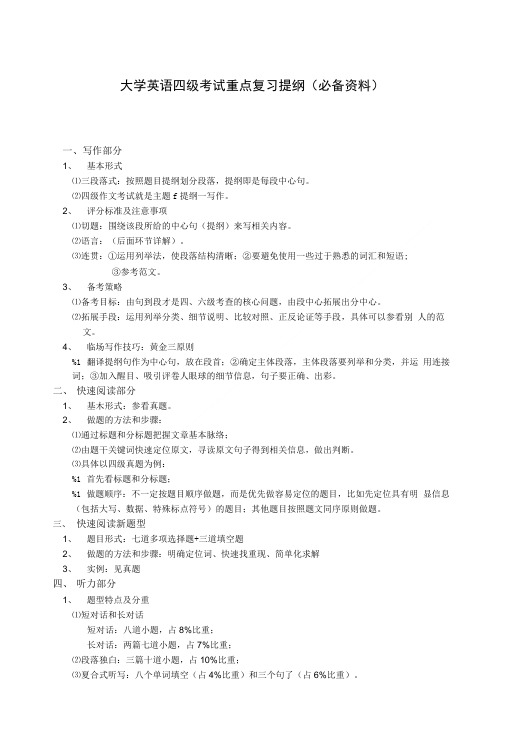
大学英语四级考试重点复习提纲(必备资料)一、写作部分1、基本形式⑴三段落式:按照题目提纲划分段落,提纲即是每段中心句。
⑵四级作文考试就是主题f提纲一写作。
2、评分标准及注意事项⑴切题:围绕该段所给的中心句(提纲)来写相关内容。
⑵语言:(后面环节详解)。
⑶连贯:①运用列举法,使段落结构清晰;②要避免使用一些过于熟悉的词汇和短语;③参考范文。
3、备考策略⑴备考目标:由句到段才是四、六级考查的核心问题,由段中心拓展出分中心。
⑵拓展手段:运用列举分类、细节说明、比较对照、正反论证等手段,具体可以参看别人的范文。
4、临场写作技巧:黄金三原则%1翻译提纲句作为中心句,放在段首;②确定主体段落,主体段落要列举和分类,并运用连接词;③加入醒目、吸引评卷人眼球的细节信息,句子要正确、出彩。
二、快速阅读部分1、基木形式:参看真题。
2、做题的方法和步骤:⑴通过标题和分标题把握文章基本脉络;⑵由题干关键词快速定位原文,寻读原文句子得到相关信息,做出判断。
⑶具体以四级真题为例:%1首先看标题和分标题;%1做题顺序:不一定按题目顺序做题,而是优先做容易定位的题目,比如先定位具有明显信息(包括大写、数据、特殊标点符号)的题目;其他题目按照题文同序原则做题。
三、快速阅读新题型1、题目形式:七道多项选择题+三道填空题2、做题的方法和步骤:明确定位词、快速找重现、简单化求解3、实例:见真题四、听力部分1、题型特点及分重⑴短对话和长对话短对话:八道小题,占8%比重;长对话:两篇七道小题,占7%比重;⑵段落独白:三篇十道小题,占10%比重;⑶夏合式听写:八个单词填空(占4%比重)和三个句了(占6%比重)。
2、重点题目分析和解题技巧⑴短对话:①预测选项;%1明确出题方式:同义替换(往往是正确答案),考查细节(要速记,要听清问题),转折(要听清转折后的内容);%1具体可以参看听力解析。
⑵长对话:①“先纵后横”预测选项:纵向确定场景(工作、学习、生活及旅游);横向排除干扰选项,了解每道小题的内容。
英语四级翻译复习资料推荐
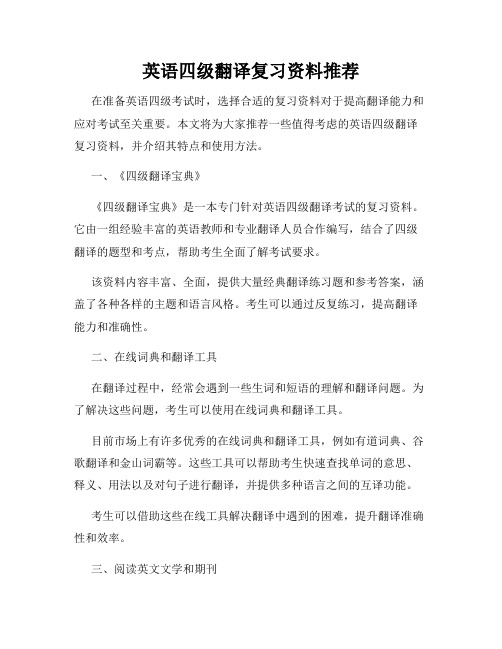
英语四级翻译复习资料推荐在准备英语四级考试时,选择合适的复习资料对于提高翻译能力和应对考试至关重要。
本文将为大家推荐一些值得考虑的英语四级翻译复习资料,并介绍其特点和使用方法。
一、《四级翻译宝典》《四级翻译宝典》是一本专门针对英语四级翻译考试的复习资料。
它由一组经验丰富的英语教师和专业翻译人员合作编写,结合了四级翻译的题型和考点,帮助考生全面了解考试要求。
该资料内容丰富、全面,提供大量经典翻译练习题和参考答案,涵盖了各种各样的主题和语言风格。
考生可以通过反复练习,提高翻译能力和准确性。
二、在线词典和翻译工具在翻译过程中,经常会遇到一些生词和短语的理解和翻译问题。
为了解决这些问题,考生可以使用在线词典和翻译工具。
目前市场上有许多优秀的在线词典和翻译工具,例如有道词典、谷歌翻译和金山词霸等。
这些工具可以帮助考生快速查找单词的意思、释义、用法以及对句子进行翻译,并提供多种语言之间的互译功能。
考生可以借助这些在线工具解决翻译中遇到的困难,提升翻译准确性和效率。
三、阅读英文文学和期刊阅读英文文学和期刊是提高英语翻译能力的有效途径。
通过阅读原汁原味的英文文章,可以增加对英语表达方式和习惯用法的了解,提升对语言的感知能力。
考生可以选择一些经典英文小说、名人演讲和学术期刊进行阅读。
在阅读过程中,应注重理解原文的意思和情感,同时对其中的难点和翻译问题进行分析和解决。
通过不断地阅读和解读英文文学作品,考生可以提高翻译的准确性,并拓展词汇和语言能力。
四、参加线上翻译讲座和研讨会随着互联网的快速发展,线上翻译讲座和研讨会成为一种便捷高效的学习方式。
通过参加这些讲座和研讨会,考生可以了解最新的翻译趋势和技巧,与其他翻译人员进行交流和讨论。
许多知名的翻译机构和语言学院都提供线上翻译课程和讲座,考生可以根据自身需求和时间安排选择适合的学习内容。
通过参与线上讲座和研讨会,考生可以拓宽视野、增加知识储备,并积累实战经验。
总结:在复习英语四级翻译时,选择合适的复习资料对于提高翻译能力至关重要。
大学英语四级考前模考试卷一附复习资料
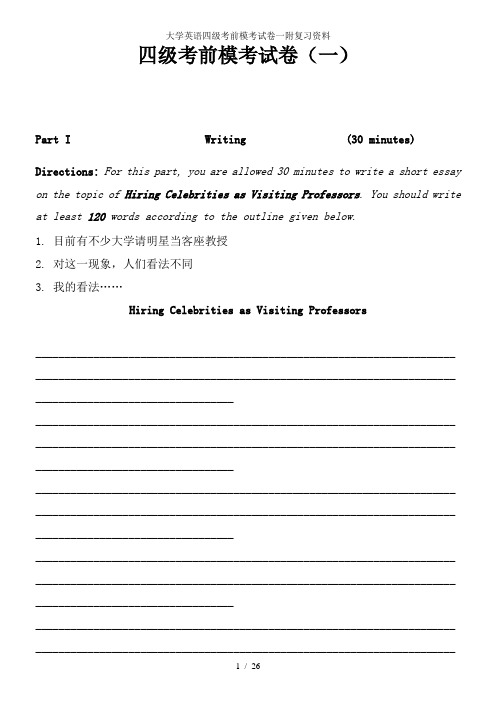
四级考前模考试卷(一)Part I Writing (30 minutes)Directions:For this part, you are allowed 30 minutes to write a short essay on the topic of Hiring Celebrities as Visiting Professors. You should write at least 120 words according to the outline given below.1. 目前有不少大学请明星当客座教授2. 对这一现象,人们看法不同3. 我的看法……Hiring Celebrities as Visiting Professors________________________________________________________________________ ________________________________________________________________________ __________________________________________________________________________________________________________ ________________________________________________________________________ __________________________________________________________________________________________________________ ________________________________________________________________________ __________________________________________________________________________________________________________ ________________________________________________________________________ __________________________________________________________________________________________________________ __________________________________________________________________________________________________________________________________________________________________________________ ________________________________________________________________________ __________________________________________________________________________________________________________ ________________________________________________________________________ __________________________________________________________________________________________________________ _________________Part II Reading Comprehension (Skimming and Scanning) (15 minutes)Directions: In this part, you will have 15 minutes to go over the passage quickly and answer the questions on Answer Sheet 1. For questions 1-7, choose the best answer from the four choices marked A), B), C) and D). For questions 8-10, complete the sentences with the information given in the passage.Eight Things Successful People Do Differently Why have you been so successful in reaching some of your goals, but not others If you aren’t sure, you are far from alone in your confusion. It turns out that even brilliant, highly accomplished people are pretty awful when it comes to understanding why they succeed or fail. The intuitive answer — that you are born predisposed to certain talents and lacking in others —is really just one small piece of the puzzle. In fact, decades of research on achievement suggests that successful people reach their goals not simply because of who they are, but more often because of what they do.Get specificWhen you set yourself a goal, try to be as specific as possible. “Lose 5pounds” is a better goal than “lose some weight”. Knowing exactly what you want to achieve keeps you motivated until you get there. Also, think about the specific actions that need to be taken to reach your goal. Just promising you’ll “eat less” or “sleep more” is too vague —be clear and precise. “I’ll be in bed by 10pm on weeknights” leaves no room for doubt about what you need to do, and whether or not you’ve actually done it.Seize the moment to act on your goalsGiven how busy most of us are, and how many goals we are juggling (同时做) at once, it’s not surprising that we routinely miss opportunities to act on a goal because we simply fail to notice them. Did you really have no time to work out today Achieving your goal means grabbing hold of these opportunities before they slip through your fingers.To seize the moment, decide when and where you will take each action you want to take, in advance. Again, be as specific as possible. Studies show that this kind of planning will help your brain to detect and seize the opportunity when it arises, increasing your chances of success by roughly 300%.Know exactly how far you have left to goAchieving any goal also requires honest and regular monitoring of your progress —if not by others, then by you yourself. If you don’t kno w how well you are doing, you can’t adjust your behavior or your strategies accordingly. Check your progress frequently —weekly, or even daily, depending on the goal. Be a realistic optimistWhen you are setting a goal, by all means engage in lots of positive thinking about how likely you are to achieve it. Believing in your ability to succeed is enormously helpful for creating and sustaining your motivation. But whatever you do, don’t underestimate how difficult it will be to reach your goal. Most goals worth achieving require time, planning, effort, and persistence. Studiesshow that thinking things will come to you easily and effortlessly leaves you ill-prepared for the journey ahead, and significantly increases the odds of failure.Focus on getting better, rather than being goodMany of us believe that our intelligence, our personality, and our physical aptitudes (才能) are fixed —that no matter what we do, we won’t improve. As a result, we focus on goals that are all about proving ourselves, rather than developing and acquiring new skills.Fortunately, decades of research suggest that the belief in fixed ability is completely wrong — abilities of all kinds are profoundly malleable (可改变的). Embracing the fact that you can change will allow you to make better choices, and reach your fullest potential. People whose goals are about getting better, rather than being good, take difficulty in stride, and appreciate the journey as much as the destination.Have grit (毅力)Studies show that gritty people obtain more education in their lifetime, and earn higher college GPAs (grade point average). Grit predicts which cadets(军校学员) will stick out their first difficult year at West Point.The good news is, if you aren’t particularly gritty now, there is something you can do about it. People who lack grit more often than not believe that they just don’t have the innate abilities successful people have —they are wrong. As I mentioned earlier, effort, planning, persistence, and good strategies are what it really takes to succeed. Embracing this knowledge will not only help you see yourself and your goals more accurately, but also do wonders for your grit.Build your willpower muscleYour self-control “muscle” is just like the other muscles in your body —when it doesn’t get m uch exercise, it becomes weaker over time. But when you give it regular workouts by putting it to good use, it will grow stronger and stronger, and be better able to help you successfully reach your goals.To build willpower, take on a challenge that requires you to do something you’d honestly rather not do. When you find yourself wanting to give in, give up, or just not bother —don’t. Start with just one activity, and make a plan for how you will deal with troubles when they occur (“If I have a desire for a snack, I will eat one piece of fresh fruit.”) It will be hard in the beginning, but it will get easier, and that’s the whole point. As your strength grows, you can take on more challenges and step-up your self-control workout.Focus on what you will do, not what you won’t doDo you want to successfully lose weight, quit smoking, or put a lid on your bad temper Then plan how you will replace bad habits with good ones, rather than focusing only on the bad habits themselves. Research on thought suppression(压制) (e.g., “Don’t think about white bears!”) has shown that trying to avoid a thought makes it even more active in your mind. The same holds true when it comes to behavior — by trying not to engage in a bad habit, our habits get strengthened rather than broken.If you want to change your ways, ask yourself, ‘What will I do instead’ For example, if you are trying to gain control of your temper and stop flying off the handle, you might make a plan like “If I am starting to feel angry, then I will take three deep breaths to calm down.” By using deep breathing as a replacement for giving in to your anger, your bad habit will get worn away over time until it disappears completely.1. Many people didn’t expect that very successful people _______.A) can succeed in difficult tasks but fail in very simple onesB) aren’t clear why they succeed in achieving their goalsC) tend to feel very lonely when they reach their goalsD) are born with some special ability to do something well2. Why should people be specific when setting a goalA) It boosts their confidence. B) It makes the goal easier to achieve.C) It saves time in reaching the goal. D) It helps sustain their motivation.3. Very often, people who miss chances to act on a goal attribute the failure to _______.A) being busy and having no time B) setting too difficult goals C) getting no notice from others D) hoping for better chances4. According to studies, when people plan specific actions in advance, _______.A) there is no doubt that they will fulfill their dreamsB) they have greater possibilities of reaching their goalsC) they are able to get their work done more efficientlyD) they are more likely to persist in face of difficulty5. The author suggests that monitoring your progress regularly _______.A) should be done by people around youB) is helpful for determining whether the goal is realisticC) enables you to make necessary adjustment in actionsD) is not always essential depending on the goal6. Thinking that goals are not difficult to reach _______.A) prepares people better for challengesB) prevents people from shying away from hardshipsC) helps people cope with difficulty calmlyD) significantly raises the possibility of failure7. What does the author say about people believing in fixed abilityA) They don’t focus on goals that improve themselves.B) They are more willing to commit to long-term goals.C) They can’t take on many challenging tasks at one time.D) Their goals are to get better instead of being good.8. People lacking determination usually believe that they are not born with _____________________________________ that successful people have.9. Your ability to control your mind and body will become stronger if you _____________________________________ and use it properly.10. According to some research, if you try to suppress thinking about white bears,it just becomes _____________________________________ in your brain.Part III Listening Comprehension (35 minutes)Section ADirections: In this section, you will hear 8 short conversations and 2 long conversations. At the end of each conversation, one or more questions will be asked about what was said. Both the conversation and the questions will be spoken only once. After each question there will be a pause. During the pause, you must read the four choices marked A), B), C) and D), and decide which is the best answer. Then mark the corresponding letter on Answer Sheet2 with a single line through the centre.11. A) Quit their jobs at the same time.B) Establish a firm in collaboration.C) Enrich their poor knowledge in business.D) Take an adventurous trip with their savings.12. A) People should not idle away their life.B) People should have made greater achievement.C) People should avoid being killed unexpectedly.D) People should have taken things more seriously.13. A) Time passes very quickly.B) The woman is wrong about the pick-up time.C) He doesn’t have anything to do.D) Before lunch is a great time to pick up the papers.14. A) She has to work to support herself. B) Her classes are not difficult.C) She goes to a full-time school. D) She takes evening courses.15. A) Jack survived the accident. B) Jack saved all the other passengers.C) Jack had little damage done to his car. D) Jack was the only victim ofthe accident.16. A) Her mild temper. B) Her broad knowledge.C) Her teaching style. D) Her detailed answers.17. A) It won’t come out until June 26.B) It hasn’t been returned by the bo rrower.C) It is not available unless it has been reserved.D) It was withdrawn from the shelf as a back issue.18. A) Their healthy lifestyle. B) Their work environment.C) Their outgoing personality. D) Their usual food and drink.Questions 19 to 22 are based on the conversation you have just heard.19. A) The rock-climbing training involves a lot of preparation.B) Rock-climbing is safe if you are experienced enough.C) The woman is not excited about the first class in rock-climbing.D) The speakers will take a climbing trip in the early spring when the icebreaks.20. A) One is safe if he is very careful.B) Hi-tech safety equipment ensures one’s safety.C) A lot of people do rock-climbing and they are OK.D) There are no dangerous places nearby to do rock-climbing.21. A) She can make a lot of friends.B) She can work more efficiently.C) She can learn mental discipline.D) She can get more familiar with the man.22. A) He might join the class.B) He will join the class if the woman does.C) He still thinks it unworthy to join the class.D) He will tell the woman once he has made a decision.Questions 23 to 25 are based on the conversation you have just heard.23. A) It’s difficult to obtain happiness.B) Happiness is only a state of mind.C) Happiness is closely related to material life.D) People shouldn’t always ask what happiness is.24. A) They have no dreams.B) They don’t feel being loved.C) They get used to what they have.D) They only cherish the material things.25. A) Expensive ones. B) Cheap ones.C) Gifts made carefully. D) Gifts that won’t last.Section BDirections:In this section, you will hear 3 short passages. At the end of each passage, you will hear some questions. Both the passage and the questions will be spoken only once. After you hear a question, you must choose the best answer from the four choices marked A), B), C) and D). Then mark the corresponding letter on Answer Sheet 2 with a single line through the centre.Passage OneQuestions 26 to 29 are based on the passage you have just heard.26. A) Pets’ value in medical research.B) What pets bring to their owners.C) How pets help people calm down. D) People’s opinions of keepingpets.27. A) If he has a pet companion. B) If he has less stress of work.C) If he often does mental calculation. D) If he is taken care of byhis family.28. A) They have lower blood pressure. B) They become more patient.C) They are in higher spirits. D) They are less nervous.29. A) People with dogs did more exercise.B) Dogs lost the same weight as people did.C) Dogs liked exercise much more than people did.D) People without dogs found the program unhelpful.Passage TwoQuestions 30 to 32 are based on the passage you have just heard.30. A) Olivetti earned more in the 1960s than in the 1950s.B) By 1930 Olivetti produced 13,000 typewriters a year.C) Some of Olivetti’s 700 staff regularly visited customers in Italy.D) Olivetti set up offices in other countries from the very beginning.31. A) Camillo Olive tti’s death. B) Its slow progress.C) A period of financial problem. D) Its agreements with othercompanies.32. A) It produces the best typewriter in the world.B) It exports more typewriters than other computers.C) It designs the world’s fi rst mainframe computer.D) It has five independent companies with its head office in Ivrea.Passage ThreeQuestions 33 to 35 are based on the passage you have just heard.33. A) He never watched TV. B) He read what he had to.C) He found reading unbelievable. D) He considered reading part ofhis life.34. A) It helps him to realize his dream.B) It opens up a wider world for him.C) It makes his college life more interesting.D) It increases his interest in worldwide travel.35. A) Why do I read B) How do I readC) What do I read D) When do I readSection CDirections:In this section, you will hear a passage three times. When the passage is read for the first time, you should listen carefully for its general idea. When the passage is read for the second time, you are required to fill in the blanks numbered from 36 to 43 with the exact words you have just heard. For blanks numbered from 44 to 46 you are required to fill in the missing information. For these blanks, you can either use the exact words you have just heard or write down the main points in your own words. Finally, when the passage is read for the third time, you should check what you have written.Today we talk about the difference between a college and a university. Colleges and universities have a lot in (36) ________. They prepare young adults for work. They provide a greater (37) ________ of the world and its past. And they help students learn to (38) ________ the arts and sciences.Students who attend either a college or a university (39) ________ take four years to complete a program of study. But one difference is that many colleges do not offer (40) ________ study programs or support research projects.Universities often are much larger than colleges. Universities carry out a lot of research. They offer more programs in different areas of study, for undergraduate and graduate students. (41) ________ universities developed from those of the Middle Ages in Europe. The word “university” came from the Latin “universitas”. Th is described a group of people organized for a common (42) ________.“College” came from a Latin word with a (43) ________ meaning, “collegium”. In England, colleges were formed to provide students with places to live. (44) ____________________________________________________.Today, most American colleges offer an area of study called liberal arts. The liberal arts are subjects first developed and taught in ancient Greece. They trained a person’s mind. (45) ________________________________.Another meaning of “college” is a part of a university. (46) __________________________________________. This is still true.Part IV Reading Comprehension (Reading in Depth) (25 minutes) Section ADirections:In this section, there is a passage with ten blanks. You arerequired to select one word for each blank from a list of choices given in a word bank following the passage. Read the passage through carefully before making your choices. Each choice in the bank is identified by a letter. Please mark the corresponding letter for each item on Answer Sheet 2 with a single line through the centre. You may not use any of the words in the bank more than once.Questions 47 to 56 are based on the following passage.Advice to “sleep on it” could be well founded, scientists say. After a good night’s sleep, a problem that seemed insurmountable (不能克服的) the night before can often appear more 47 , although the evidence until now has been anecdotal (轶事的).But researchers at the University of Luebek in Germany have designed an exp eriment that shows a good night’s sleep can 48 insight and problem-solving. Dr. Jan Born, a neuroscientist at the university, and his team taught volunteers two simple rules to help them 49 a string of numbers into a new order. There was also a third, 50 rule, which could help them increase their speed in solving the problem. The researchers divided the volunteers into two groups: half were allowed to sleep after the training while the 51 were forced to stay awake. They noticed that the group that had slept after the training were twice as 52 to figure out the third rule as the other group.“You have a memory representation in your brain of the problem you want to solve, and then you sleep. Sleep can act on the problem,” Born said in a telephone interview. But he also admitted that how restructuring of memories occurs or what governs it is still 53 .Other scientists say the 54 evidence supports the anecdotal suggestionsthat sleep can stimulate creative thinking.Although the role of sleep in human creativity will 55 be a mystery, the research gives people good reason to 56 respect their periods of sleep.Section BDirections:There are 2 passages in this section. Each passage is followed by some questions or unfinished statements. For each of them there are four choices marked A), B), C) and D). You should decide on the best choice and mark the corresponding letter on Answer Sheet 2 with a single line through the centre.Passage OneQuestions 57 to 61 are based on the following passage.Many of us sit in front of a computer for eight hours a day, and then go home and head for the couch to surf the Web or watch television, exchanging one seat and screen for another. Even if we try to squeeze in an hour at the gym, is it enough to counteract (抵消) all that motionless sittingA mounting body of evidence suggests not.Increasingly, research is focusing not on how much exercise people get, but how much of their time is spent in sedentary (久坐的) activity, and the harm that does.The latest findings, published this week in The Journal of the American College of Cardiology, indicate that the amount of leisure time spent sitting in front of a screen can have such an overwhelming, seemingly irreparable (无法弥补的) impact on one’s health that physical activity doesn’t produce much benefit.The study followed 4,512 middle-aged Scottish men for a little more than four years on average. It found that those who said they spent two or more leisure hours a day sitting in front of a screen were at double the risk of a heart attack or other heart events compared with those who watched less. Those who spent four or more hours of recreational time in front of a screen were 50 percent more likely to die of any cause. It didn’t matter whether the men were physically active for several hours a week —exercise didn’t reduce the risk associated with the high amount of sedentary screen time.The study is not the first to suggest that sedentary activities like television viewing may be harmful. A 2009 study reported that young children who watch one and a half to five and a half hours of TV a day have higher blood pressure readings than those who watch less than half an hour, even if they are thin and physically active.Recreational screen time has an “independent, injurious relationship”with heart and the blood vessels events and death of all causes, the paper concluded, possibly because it induces metabolic (新陈代谢) changes.The study focused on recreational screen time because it’s the easiest to reduce, Dr. Stamatakis said. But he encouraged employees who work at computers all day to get up and take breaks and short walks periodically.57. According to the passage, more and more evidence proves that ______.A) people doing regular exercises after work tend to enjoy good healthB) people nowadays seem to spend excessive time seated at homeC) the time people spend watching TV is increasing dramaticallyD) physical activities don’t reduce the bad effect of long time’s sitting58. What do we learn from the study published in The Journal of the AmericanCollege of CardiologyA) The more people watch TV, the healthier they will become.B) The amount of exercises people get should be taken seriously.C) The harm done by sedentary activities seems impossible to repair.D) Exercise can make up for damage caused by high amount of sitting time.59. A 2009 study supported the idea that ______.A) physical inactivity may do harm to people’s healthB) the length of time spent in taking exercises do matterC) television viewers are more likely to die of heart diseasesD) thin teenagers are immune to disease caused by watching TV60. Why leisure time spent in front of the screen is related to heart diseasesA) Some content of the TV programs makes the heart beat faster.B) It causes che mical processes in people’s body to change.C) Extended sitting slows circulating blood to the heart.D) Radiation from the screen causes physical harm to the heart.61. Dr. Stamatakis suggested people who rely on computers to work ______.A) secretly combine business with leisureB) quit their current jobs as soon as possibleC) take breaks from the screen at regular intervals of timeD) get up early so as to take regular exercises in the morningPassage TwoQuestions 62 to 66 are based on the following passage.If two scientists at Los Alamos National Laboratory are correct, people will still be driving gasoline-powered cars 50 years from now, giving out heat-trapping carbon dioxide into the atmosphere —and yet that carbon dioxide will not contribute to global warming.The scientists, F. Jeffrey Martin and William L. Kubic Jr., are proposing a concept, which they have named Green Freedom, for removing carbon dioxide from the air and turning it back into gasoline.The idea is simple. Air would be blown over a liquid solution which would absorb the carbon dioxide. The carbon dioxide would then be extracted (提取) and subjected to chemical reactions that would turn it into fuel.Although they have not yet built a synthetic fuel factory, or even a small prototype (原型), the scientists say it is all based on existing technology.“Everything in the concept has been built, is operating or has a close cousin that is operating,” Dr. Martin said.The Los Alamos proposal does not violate any laws of physics, and other scientists have independently suggested similar ideas.In the efforts to reduce humanity’s emissions of carbon dioxide, three solutions have been offered: hydrogen(氢)-powered fuel cells, electric cars and biofuels. Biofuels are gasoline substitutes produced from plants like corn or sugar cane. Plants absorb carbon dioxide as they grow, but growing crops for fuel takes up wide strips of land.Hydrogen-powered cars emit no carbon dioxide, but producing hydrogen requires copious(大量的) energy, and if that energy comes from coal-fired power plants, then the problem has not been solved.Electric cars also push the carbon dioxide problem to the power plant. And electric cars have typically been limited to a range of tens of miles as opposed to the hundreds of miles that can be driven on a tank of gas.Gasoline, it turns out, is an almost ideal fuel (except that it produces CO2). If it can be made out of carbon dioxide in the air, the Los Alamos concept may mean there is little reason to switch, after all.“It’s definitely worth pursuing,” said Martin I. Hoffert, a professor of physics at New York University. Other scientists also said the proposal looked promising but could not evaluate it fully because the details had not been published.62. What is most remarkable about the proposal made by the two scientistsA) It is given a special name. B) No law of physics is violated.C) It is based on existing technology. D) CO2 can be converted intofuel.63. What does the author say about biofuelsA) They are considered as ideal substitutes for fossil fuels.B) It is a great waste to use so many plants to produce fuels.C) They help ease global warming but will use a large area of land.D) Cars using biofuels have a longer range than cars running on gas.64. The biggest problem with hydrogen-powered cars is that ______.A) there is no cheap source of hydrogen energyB) they may still be a cause of global warmingC) safety problems might occur in hydrogen productionD) they are not suitable for long-distance travel65. What will happen if what is proposed by the two scientists becomes trueA) There will be no need for gasoline substitutes.B) Air pollution will become a thing of the past.C) People will be able to use much cheaper energy.D) There will be no more gasoline-powered vehicles.66. What is the author’s purpose of writing this passageA) To compare different energy sources.B) To introduce a new concept of zero carbon gasoline.C) To explain why gasoline is important to us.D) To discus how to solve the problem of global warming.Part V Cloze (15 minutes) Directions:There are 20 blanks in the following passage. For each blank there are four choices marked A), B), C) and D) on the right side of the paper. You should choose the ONE that best fits into the passage. Then mark the corresponding letter on Answer Sheet 2with a single line through the centre.Another person’s enthusiasm was what。
英语四级考试历年真题的复习重点

英语四级考试历年真题的复习重点英语四级考试是中国大学英语四级水平的国家统一考试,旨在评估学生在英语听、说、读、写四个方面的能力。
准备四级考试时,复习历年真题是非常重要的一环。
通过复习历年真题,可以熟悉考试的题型和内容,为取得好成绩做好充分准备。
本文将对英语四级考试历年真题的复习重点进行介绍。
一、听力理解听力理解是四级考试的第一部分,通常包括长对话、短对话、听力填空和听力选择题。
针对历年真题,可以从以下几个方面进行复习:1. 听懂场景对话:历年考试中,经常出现一些场景对话,如在餐厅、图书馆等地的对话。
复习时,可以通过听力材料,注意场景对话的常用词汇和短语,了解常见的对话形式和交流方式。
2. 掌握听力技巧:听力考试中,有时会出现一些陌生词汇或句子,需要通过上下文的暗示来理解。
此时,可以通过练习提高推测词义和理解上下文的能力。
3. 训练听力速度:四级听力较快,对学生的听力速度和注意力要求较高。
可以通过听力练习,提高听力速度和抓住重要信息的能力。
二、阅读理解阅读理解是英语四级考试的第二部分,通常包括选词填空、判断正误和短文填空。
复习历年真题时,可以从以下几个方面进行重点复习:1. 阅读技巧:四级阅读要求阅读速度较快,考察学生对文章中主旨、细节、态度等方面的理解。
可以通过多做阅读题,提高阅读理解的准确性和速度。
2. 学术词汇:四级考试中常出现一些学术词汇,需要学生对这些词汇有一定的了解和掌握。
可以通过背单词、词汇记忆等方式来提高学术词汇的掌握程度。
3. 理解文章结构:四级阅读中的文章结构多样化,有时需要学生理解文章之间的逻辑关系。
可以通过分析文章的段落结构和句子之间的连接词来提高对文章结构的理解能力。
三、完形填空完形填空是四级考试的第三部分,通过选择正确的单词或短语来填写文章中的空白处。
复习历年真题时,可以从以下几个方面进行重点复习:1. 通读全文:在做完形填空题之前,可以先通读全文了解文章的大意和主题。
大学英语四级复习资料·骨灰级整理版.doc

大学英语四级复习资料·骨灰级整理版滴水渐累成沧海,拳石频移成泰山大学英语四级复习资料高欣玉祝大家顺利过级目录第一部分.听力部分??????????????????????2 第二部分. 最新英语四级高频词汇???????????????23 第三部分.四级阅读笔记????????????????????31 第四部分.完形填空做题技巧??????????????????36 第五部分.翻译经典练习????????????????????38 . 第六部分.写作七类精彩句型??????????????????40 第七部分.写作必备模板和句型?????????????????42 第八部分.综合技能训练????????????????????45 第九部分.作文训练??????????????????????73 第十部分.英语谚语警句????????????????????85资料说明:本复习资料非教材用书。
复习资料主要收集了四级听力、阅读、词汇、作文等一些英语四级相关的技巧、方法和内容,主要提供给有需要考四级的同学自己复习所用。
1祝大家顺利过级第一部分.听力部分一、听力内容 1.Section A 对话短对话 (5 分 02 秒) 8 个对话: 4 分 12 秒长对话 (5 分 58 秒) Conversation 1 (4 questions):对话内容(1 分 45 秒)+问题(1 分 25 秒) Conversation 2 (3 questions):对话内容(1 分 45 秒)+问题(1 分 02 秒) 2.Section B Directions: Passage 1 (3 Passage 2 (3 Passage 3 (4 短文(10 分 05 秒) 35 秒 questions):文章内容(1 分 25 秒)+问题(1 分 10 秒) questions):文章内容(2 分 25 秒)+问题(1 分 10 秒) questions):文章内容(1 分 45 秒)+问题(1 分 55 秒)3.Section C 复合式听写 (11 分 20 秒) Directions: 45 秒第一遍: 2 分10 秒第二遍:第一句停顿:1 分 05 秒第二句停顿:1 分 35 秒第三句停顿:1 分 15 秒第三遍:2 分 10 秒(以上时间根据文章内容会有所变化)二、听力技巧四级听力一直困扰着我们每一位考生,听不懂磁带中的内容是什么,不知道该如何选择,而听力在英语四级考试中又占很大一部分比重,掌握好英语四级听力技巧才能快速提高英语成绩,以下总结出几点有关英语四级听力技巧。
- 1、下载文档前请自行甄别文档内容的完整性,平台不提供额外的编辑、内容补充、找答案等附加服务。
- 2、"仅部分预览"的文档,不可在线预览部分如存在完整性等问题,可反馈申请退款(可完整预览的文档不适用该条件!)。
- 3、如文档侵犯您的权益,请联系客服反馈,我们会尽快为您处理(人工客服工作时间:9:00-18:30)。
写作万能理由(Omnipotence)1. 方便:convenient/ convenience2. 效率:efficient/ efficiently/ efficiency 8. 安全和危险:safe, danger, risk3. 节省和浪费:save time/ money/ space; economical, thrift;waste time/ money/ space; costly, lavish4. 人的心理健康:independent, cooperative, competitive, considerate, confident, creative, sociable,perseverance; selfish, isolated, conserative5. 人的身体健康:health, disease, strong, strength, energetic 7. 环境:environment, pollute, poisonous, dirty6. 娱乐:colorful, pleasure,joy, recreation, entertainmentm, relax ,tired, boring, lonely9. 经验:experience, social experience, enter the society 10. 人际:humane, fair, unfair, help, assist, freedom, freely3. 现代社会今昔非比today's society is not what it was4. 许多知识a wide range of knowledge/ a large scope of knowledge/ much knowledge;一、比较1.The advantage far outweigh the disadvantages.2.The advantages of A are much greater than those of B.3.A may be preferable to B, but A suffers from the disadvantages that……4.It is reasonable to maintain that ……but it would be foolish to claim that……5.For all the disadvantages, it has its compensating advantages.6.Like anything else, it has its faults.7.A and B has several points in common. 8.A bears some resemblances toB.9.However, the same is not applicable to B. 10. A and B differ in several ways.11. Evidently, it has both negative and positive effects. 13. The same is true of B.12. People used to think ……, but things are different now.14. Wondering as A is ,it has its drawbacks.15. It is true that A …… , but the chief faults (obvious defects )are ……二、原因1.A number of factors are accountable for this situation.A number of factors might contribute to (lead to )(account for )the phenomenon(problem).2. The answer to this problem involves many factors.3. The phenomenon mainly stems from the fact that……4. The factors that contribute to this situation include…… 6. We may blame ……,but the real causes are……5. The change in ……largely results from the fact that……7. Part of the explanations for it is that ……One of the most common factors (causes )is that ……Another contributing factor (cause )is ……Perhaps the primary factor is that …But the fundamental cause is th at ……三、后果1. It may give rise to a host of problems.2. The immediate result it produces is ……3. It will exercise a profound influence upon……4. Its consequence can be so great that……四、批驳1)It is true that ……, but one vital po int is being left out. 3)Some people say ……, but it does not hold water.2)There is a grain of truth in these statements, but they ignore a more important fact.4)Many of us have been under the illusion that……6)It makes no sense to argue fo r ……5)A close examination would reveal how ridiculous the statement is.7)Too much stress placed on …… may lead to ……8)Such a statement mainly rests on the assumption that ……9)Contrary to what is widely accepted, I maintain that ……五、举例1)A good case in point is ……2)As an illustration, we may take ……3)Such examples might be given easily. 4)……is often cited as an example.六、证明1)No one can deny the fact that ……2)The idea is hardly supported by facts.3)Unfortunately, none of the available data shows ……4)Recent studies indicate that ……5)There is sufficient evidence to show that ……6)According to statistics proved by ……, it can be seen that ……七、开篇1)Many nations have b een faced with the problem of ……8)According to a recent survey, ……2)Recently the problem has been brought into focus. 9)With the rapid development of ……3)Recently the phenomenon has become a heated topic.4)Recently the issue h as aroused great concern among ……5)Nowadays there is a growing concern over ……6)Never in our history has the idea that …… been so popular.7)Faced with ……, quite a few people argue that ……八、结尾1)From what has been discussed above, we can dr aw the conclusion that ……2)It is high time that strict measures were taken to stop ……3)It is necessary that steps should be taken to ……4)In conclusion, it is imperative that ……5)There is no easy method, but ……might be of some help.6)To solve the above-mentioned problem, we must ……10)Taking all these into account, we ……7)In summary, if we continue to ignore the above-mentioned issue, more problems will crop up.8)With the efforts of all parts concerned, the problem will be solved thoroughly.9)We might do more than identify the cause ; it is important to take actions to ……11)Whether it is good or not /positive or negative, one thing is certain/clear……2.表示好处1)It has the following advantages. 2)It does us a lot of good. 3)It benefits us quite a lot.4)It is beneficial to us. 5)It is of great benefit to us.3.表示坏处1)It has more disadvantages than advantages. 2)It does us much harm 3)It is harmful to us.4.表示重要、必要、困难、方便、可能1)It is important(necessary,difficult,convenient,possible)for sb. to do sth.2)We think it necessary to do sth. 3)It plays an important role in our life.5.表示措施1)We should take some effective measures. 2)We should try our best to overcome(conquer)the difficulties.3)We should do our utmost in doing sth. 4)We should solve the problems that we are confronted(faced)with.九、1)With the deepening of Chinese reform and opening up2)When it comes to……,some people think /believe……that……,others argue /claim that opposite /reverse is true.There is probably……some truth in both arguments/statements,but……当说到……,有些人认为……,但另一些人则持相反的观点……。
